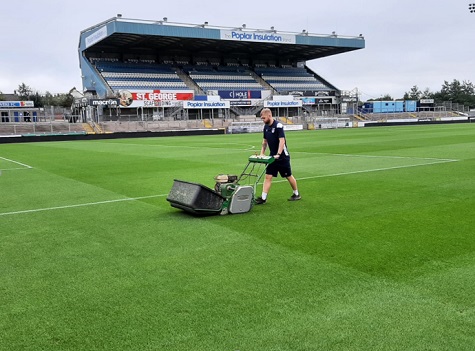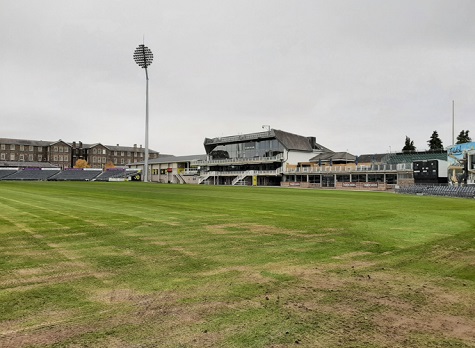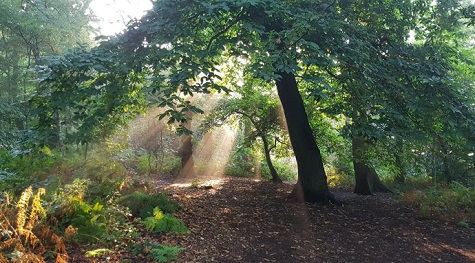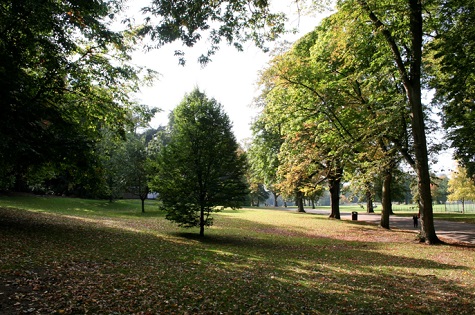Last week I had the opportunity to visit Bristol Rovers FC where I was attending an interview with Joe Hendy for an upcoming AGS Turf podcast.
I have known Joe for many years, and we had a very enjoyable walk-down-memory-lane chat, talking about the many facets of our wonderful industry. We will publish my interview in a future edition of TurfPro.
It was also the first time I had managed to visit Bristol Rovers and catch up with the club’s stadium ground staff, Ben Ford and Luke Bayliss, who were busy mowing and preparing the pitch for the weekend’s game.

L-R: Ben Ford and Laurence Gale
The recent onset of a changing autumn weather front usually brings with it lower soil and air temperatures, rain, and heavy morning dews. These changes certainly can impact the maintenance regimes required and the quality of grass cover you can maintain going into this early winter period.
Ben was pleased with the quality of grass cover he had but was conscious of how quickly playing surfaces can change especially if you have a spate of additional fixtures and use on your pitch.

Luke Bayliss mowing Bristol Rovers pitch
Joe and I then took the opportunity to call in to see Sean at Gloucester CCC which is just round the corner from the Rovers ground.

He, like most county cricket groundstaff, has just completed his end of season renovations and had covered the square with a germination sheet. It has been a couple of years since I last visited the ground, so it was nice to meet up with Sean and catch up with the industry gossip.
RFU
On the rugby pitch front I’m pleased to announce the RFU Rugby Groundsman Connected programme is again up and running.

Rugby clubs will have an opportunity to contact the scheme, receiving a pitch inspection and advice on what funding there will be available for pitch improvements. This new Pitch Advisory service (PAS) programme is part of a revamped national programme that is being run by the GMA and the relevant sporting bodies.
The Pitch Advisory Service, formerly the Grounds and Natural Turf Improvement Programme, was launched in 2014 and is funded by Sport England and the Football Foundation, working in association with the ECB, RFL and RFU.
With the addition of RFL and RFU, Phase 3 has seen the programme grown considerably; led by chief operating officer, Jason Booth, the team now consists of four key account managers, one programmes support lead, eleven regional pitch advisors and one administrator. The aim of the PAS is to raise the standards of sports surfaces as well as the understanding of sports turf management practices among grassroots sports clubs across England.
As an official RFU voluntary pitch advisor (VPA) for the Midlands, I am looking forward to working with the new team of GMA nominated RFU pitch advisors who will be on hand to help clubs improve their pitches.
Regional Pitch Advisors - Rugby Union
- North: Ian Sommerville
- Midlands: Todd Harrison
- West: Simon Johnson
- London and South East: Darren Symonds (KAM)
Value of trees
Finally, this week I read an interesting article on the merits of the potential of mature trees and indeed large tracts of grass land that can become effective carbon sinks.
Mature oak trees can increase the amount of carbon dioxide they absorb, potentially giving climate scientists a new tool in their arsenal to combat the climate crisis, researchers at the University of Birmingham have discovered.

According to the article, early results from a 10-year study found that old oak forests can help to curb rising CO2 levels by increasing the amount of the gas that they absorb. While increased CO2 absorption cannot extinguish all of the issues related to carbon emissions, the research adds to a body of work that can help guide climate policy in regard to the use of forests as carbon sinks.
In the ongoing experiment, 175-year-old oak trees in the Free-Air CO2 facility at the University of Birmingham Institute of Forest Research (BIFoR) in Staffordshire were bathed in carbon dioxide-enriched air and compared with a control group that were exposed only to atmospheric CO2.
The level of CO2 used in the enriched air is 37 per cent higher than atmospheric levels and is intended to mimic levels of the gas projected to be seen in 2050.
After three years, researchers have discovered that, under conditions of elevated CO2, mature oak trees can increase their rate of photosynthesis – converting carbon dioxide and water into sugar to use as food – by up to a third. Early research suggests that they do so by absorbing and storing more of the gas from the air.
This is fantastic news for the environment and tackling CO2 climate emissions. For most horticulturalists, gardeners and grounds professionals we have known for years the benefits of planting trees. This ten-year study has given us the proof and the incentive to plant more trees in the coming years.

I remember attending a World Urban Parks conference where we had some presentations from parks officers from South America who talked about some cities that had not planted any green infrastructure within its city and reported on the problems of fumes, heat and air pollution. Fundamentally, they were not very nice places to live.
We are very lucky to be living in the UK where most cities have a plethora of mature trees growing in their urban environment - we just need to ensure we continue to keep planting plenty of new trees. Also I believe we must enhance the quality of grass cover we manage, because the grass plant is also an efficient converter of carbon through the process of photosynthesis.